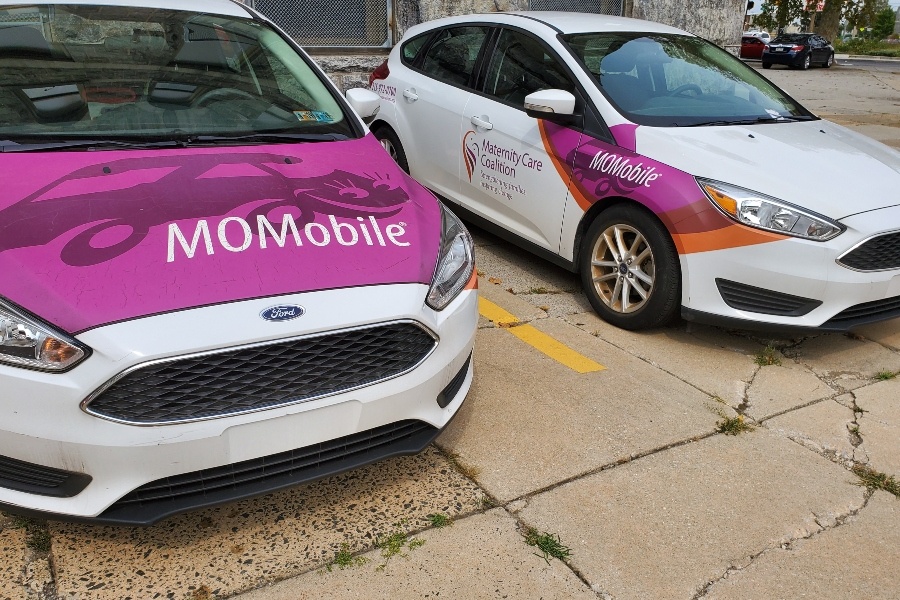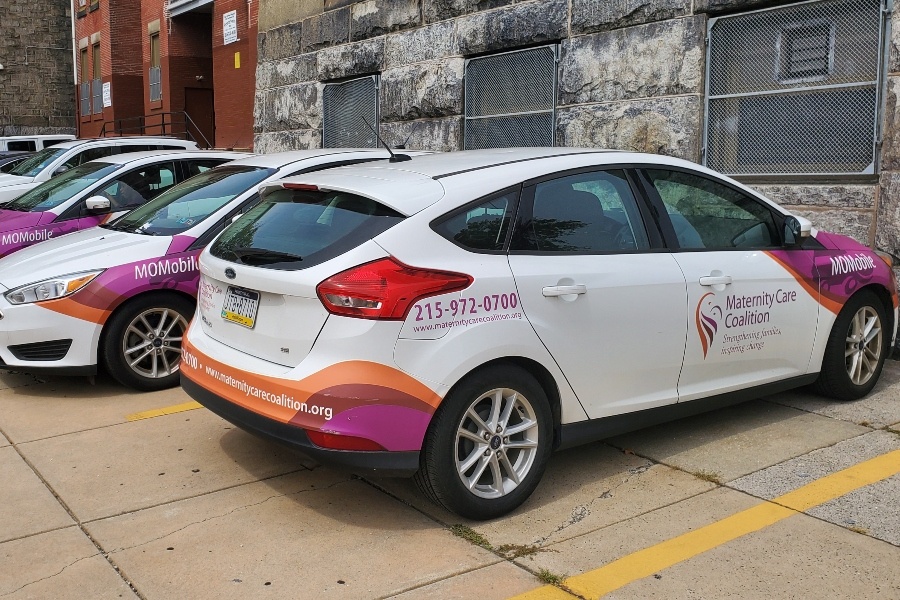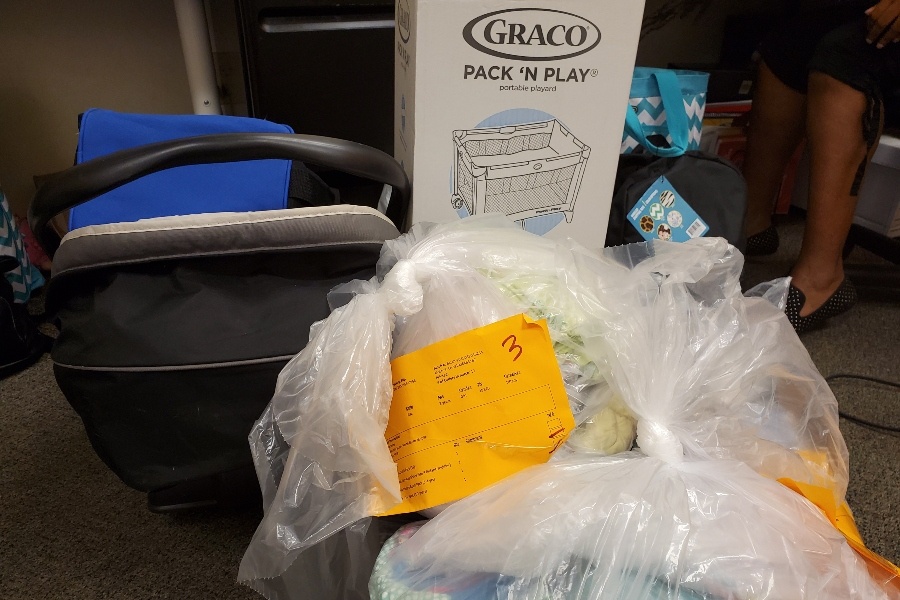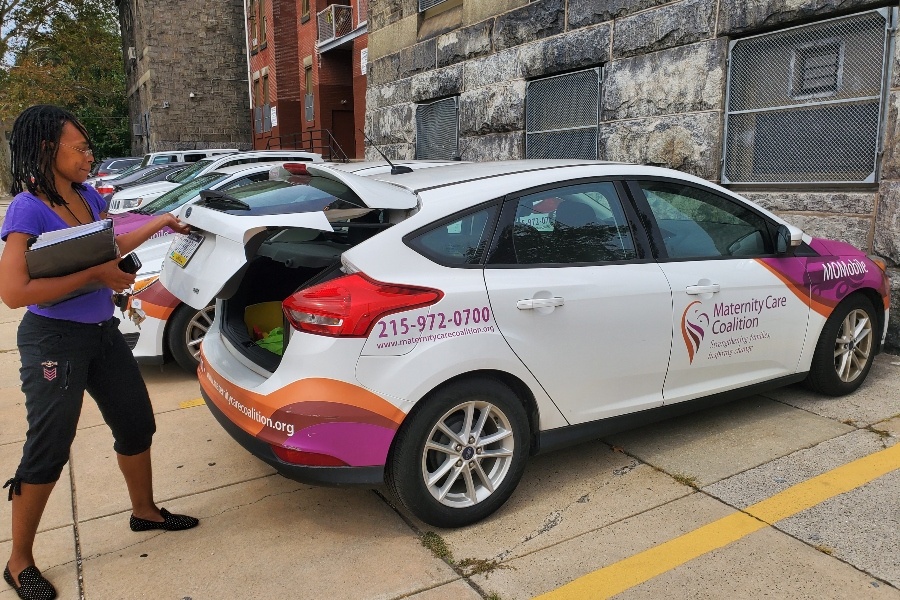Here’s How This Fleet of MOMobile Cars Helps Battle Infant Mortality
Advocates with Philly nonprofit Maternity Care Coalition hit the road to visit pregnant women and new moms at home and in prison.

MOMobile is a community-based home visiting program that provides free support and education to help families manage the changes and challenges of pregnancy and parenting. / Queen Muse
They say it takes a village to raise a child. For many expecting moms and families in Philadelphia, Maternity Care Coalition (MCC) has been that village.
Since it first launched in 1980, the local nonprofit has provided parenting resources to more than 125,000 pregnant women and families in Pennsylvania. Instead of making parents travel to find services, MCC brings the village directly to clients’ homes through its signature MOMobile Healthy Start program.
MOMobile is a community-based home visiting program that provides free support and education to help families manage the changes and challenges of pregnancy and parenting. The program aims to reduce infant mortality and improve maternal and child health. It’s a critical need in Philadelphia, a city that has an infant mortality rate that’s 75 percent higher than the national average and one of the highest rates of maternal mortality in the United States.
NextHealth PHL spent the day with MOMobile advocate LaNeice Cole to see firsthand how the program helps Philly families navigate the challenges of parenting. Here’s what we learned.
The Locations
The Fleet

MOMobile advocates use the program’s small fleet of five cars to visit clients’ homes. / Courtesy
You may have seen these colorful cars riding through the city, and you’ve probably wondered what they do. MOMobile advocates use the program’s small fleet of five cars to visit clients’ homes.
On an average day, an advocate might visit one to three families. Cole says having a reliable mode of transportation makes it easier for advocates to commute between the program’s Germantown headquarters and clients’ homes.
The Advocates

LaNeice Cole has been a MOMobile advocate for three years./ Queen Muse
MOMobile advocates are trained to provide critical support to pregnant women, new parents, and families with children under the age of three. Many advocates come to MCC with specialized experience in certain areas. Some are certified lactation counselors, others are bilingual; the latter helps the program serve its large base of Spanish-speaking families.
All advocates learn a core curriculum and undergo training for Healthy Families America‘s evidence-based home visiting model. During training, advocates learn how to assist parents with activities like tummy time and mommy-baby bonding, and more complex issues like identifying abusive relationships and establishing healthy discipline tactics.
LaNeice Cole joined the MOMobile program in 2016. She came in as a temporary employee and eventually transitioned to full-time. Prior to joining MCC, Cole had spent several years working with moms and babies at a local homeless shelter. She says this experience combined with her background in psychology “made MCC the perfect place to pursue what I believe is definitely a calling and a passion of mine.”
While MOMobile advocates give parents lots of advice, Cole insists the services they provide are meant to support, not supplant a doctor’s recommendations.
“We support the doctors. We give parents the hows and the whys for the instructions doctors give them to help them make more informed decisions,” Cole said.“It’s a strength-based approach. These families already have strengths, morals and traditions. We want to empower them to incorporate those things into good parenting.”
Cole manages a caseload of about 15 clients that she visits on a weekly, bi-weekly or monthly basis, depending on the family’s needs. She also has two sons of her own, ages three and six. Cole admits she applies some of the same parenting tools she shares with her clients at home with her two boys, and she uses her own struggles with parenting to relate to the clients she visits.
“I’m a mom first,” Cole added. “I think it’s divine that I’ve been able to use my experience to help other mamas.”

Families in the MOMobile program also get access to free items that are donated by MCC partner organizations or members of the community. / Queen Muse
Families in the MOMobile program also get access to free items that are donated by MCC partner organizations or members of the community. If a family expresses a need for anything from a portable play yard to clothes or diapers, advocates will facilitate getting the donated items to the client’s home.
MOMobile advocates provide support to clients through phone calls, video conferences and, most often, home visits.
The Home Visit

Cole manages a caseload of about 15 clients that she visits on a weekly, bi-weekly or monthly basis, depending on the family’s needs. / Queen Muse
During a home visit, a MOMobile advocate might provide breastfeeding support, assist with planning a child’s upcoming doctor’s visits or support a parent in engaging in play activities with their child. Advocates might also use home visits to help families secure access to healthcare, public benefits or social service programs. Or, like in the case of the client Cole visited during our ride-along, advocates use their face-to-face time with clients to help them problem-solve.
The client we visited has been in the program since she was six months pregnant; her child is now 26 months old and is in the process of being evaluated for autism. As a single parent with an older child who is already on the autism spectrum, this mom expressed a need for all the help she could get.
In addition to helping the client with goal setting — creating a timeline for when she would complete each step in the process toward getting her son evaluated — Cole talked with the client about strategies for managing her toddler’s tantrums, while honoring her own feelings and frustrations in the process. Cole even discussed an issue the client was experiencing with her landlord and provided referrals to resources the client could contact to have repairs done in her home. The home visit seemed to allow the two to accomplish much more than what might’ve been covered on a phone call alone.
According to Cole, most MOMobile participants say they’re satisfied with the services they receive. Still, Cole noted, some clients might feel awkward having strangers in their home so often. The program is completely free and voluntary, so parents can leave at any point in the process. But those who stay for the longterm often begin to view their advocates as helpful additions to their families.
“Everybody doesn’t feel comfortable having someone in their home,” Cole said. “But we work to build a strong rapport with our parents. We want them to feel they are a part of something special.”


